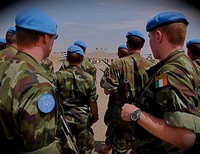With NATO leaders meeting in Chicago for the alliance's biannual summit of heads of state and government, attention will be focused on the gathering's high-profile agenda items. In some ways, it's a lineup of the usual suspects, with the summit's declaration likely to resemble a collection of increasingly implausible platitudes worthy of a Mad Libs satire: Whether regarding Afghanistan, the alliance's European-based missile defense system or the move toward “Smart Defense” to maintain military capabilities in the face of budgetary constraints, few observers will be convinced by the declarations of progress, confidence and resolve, respectively. As is customary for a NATO summit, the alliance's credibility will suffer, and its relevance will be called into question.
As is also customary for a NATO summit, reports of the alliance's imminent demise will be greatly exaggerated. Nonetheless, the fundamental and persistent questions that continue to dog the alliance, as well as its increasingly apparent weaknesses that only seem likely to worsen over the coming few years, cannot be easily dismissed -- not only because of their implications for the future of trans-Atlantic security ties, but also because of what they suggest about Europe's future role as a global power. Almost 20 years ago, Sen. Richard Lugar famously stated that NATO must go out of area if it was to avoid going out of business. The alliance's current challenges are in many ways the consequence of its decision to go out of area, specifically in Afghanistan. What we are witnessing, then, with the emphasis on moving the focus back to Europe, is quite possibly the end of any European aspiration to play a global security role, even in its immediate neighborhood. In this regard, the Libya mission, which highlighted the limited military capabilities of even the alliance's most capable members, represented not so much a model for future alliance operations, but rather a high-water mark of European interventionism.
That comes as no surprise for those who have been following trans-Atlantic debates on the subject over the past decade. The American vision of a global gendarmerie of Western powers has never been well-received in Europe. But the idea that in an increasingly competitive global arena a major power will never be called upon to actually defend its interests -- or at least to use its military capabilities to shape the discussion over any challenges to those interests -- is a particularly European one. In part, this idea has taken hold among European publics and been reflected in the policies of their elected governments because of the assumption that the European space has been historically rid of the threat of conflict. Even setting aside the several remaining frozen conflicts from the post-Cold War period and the “anomaly” of the bloody breakup of the former Yugoslavia, the utopian nature of that assumption has always been apparent.

